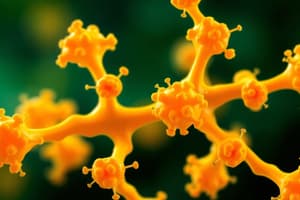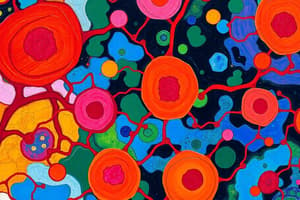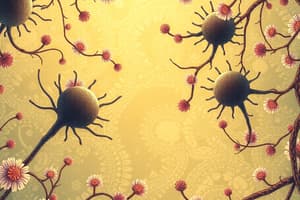Podcast
Questions and Answers
What are the 2 types of MHC proteins?
What are the 2 types of MHC proteins?
- MHC III
- MHC II (correct)
- MHC IV
- MHC I (correct)
Peptides derived from cytosolic proteins are bound to what class of MHC proteins?
Peptides derived from cytosolic proteins are bound to what class of MHC proteins?
MHC I
What do MHC proteins present on their surface?
What do MHC proteins present on their surface?
Present peptides
What are the 3 genes that encode class I MHC molecules?
What are the 3 genes that encode class I MHC molecules?
What properties allow MHC proteins to be diverse?
What properties allow MHC proteins to be diverse?
What is the structure of Class I MHC proteins?
What is the structure of Class I MHC proteins?
Where do the sequence differences between the vast number of alleles mainly occur?
Where do the sequence differences between the vast number of alleles mainly occur?
What are anchor residues crucial for?
What are anchor residues crucial for?
A tremendous range of peptides can be presented by MHC class I molecules because?
A tremendous range of peptides can be presented by MHC class I molecules because?
What is an additional feature of MHC-peptide complexes?
What is an additional feature of MHC-peptide complexes?
The receptor that recognizes peptides displayed by MHC proteins on target cells is the?
The receptor that recognizes peptides displayed by MHC proteins on target cells is the?
Class II MHC proteins are expressed only by?
Class II MHC proteins are expressed only by?
Where do the peptides presented by class II MHC proteins come from?
Where do the peptides presented by class II MHC proteins come from?
What is the difference between MHC I and MHC II?
What is the difference between MHC I and MHC II?
What is the structure of MHC II?
What is the structure of MHC II?
What is the difference in structure between the 2 MHCs?
What is the difference in structure between the 2 MHCs?
Why can class II molecules accommodate longer peptides than class I?
Why can class II molecules accommodate longer peptides than class I?
Peptide-binding specificity of each class II molecule depends on?
Peptide-binding specificity of each class II molecule depends on?
Flashcards
MHC Polymorphism
MHC Polymorphism
MHC proteins are highly polymorphic, meaning they have many different versions (alleles) within a population. This diversity helps the immune system recognize a wide range of pathogens.
MHC Function
MHC Function
MHC proteins are responsible for presenting antigen fragments (peptides) to T cells, triggering an immune response.
MHC I Peptide Source
MHC I Peptide Source
MHC class I proteins present peptides derived from proteins found inside cells (the cytosol).
MHC II Peptide Source
MHC II Peptide Source
Signup and view all the flashcards
MHC Peptide Binding Region Variability
MHC Peptide Binding Region Variability
Signup and view all the flashcards
Anchor Residues
Anchor Residues
Signup and view all the flashcards
MHC Peptide Presentation Specificity
MHC Peptide Presentation Specificity
Signup and view all the flashcards
MHC-Peptide Complex Stability
MHC-Peptide Complex Stability
Signup and view all the flashcards
TCR Recognition of MHC-Peptide Complexes
TCR Recognition of MHC-Peptide Complexes
Signup and view all the flashcards
Genes Encoding MHC I
Genes Encoding MHC I
Signup and view all the flashcards
Genes Encoding MHC II
Genes Encoding MHC II
Signup and view all the flashcards
MHC I Structure
MHC I Structure
Signup and view all the flashcards
MHC II Structure
MHC II Structure
Signup and view all the flashcards
MHC Peptide Length Accommodation
MHC Peptide Length Accommodation
Signup and view all the flashcards
Expression of MHC II
Expression of MHC II
Signup and view all the flashcards
MHC II Specificity
MHC II Specificity
Signup and view all the flashcards
Class I MHC Structure
Class I MHC Structure
Signup and view all the flashcards
Class II MHC Structure
Class II MHC Structure
Signup and view all the flashcards
Study Notes
Types of MHC Proteins
- Two main classes: MHC I and MHC II.
Peptide Binding
- MHC I binds peptides derived from cytosolic proteins.
- MHC II presents peptides from proteins internalized via endocytosis.
Function of MHC Proteins
- MHC proteins display peptides on their surface for recognition by T-cell receptors (TCR), facilitating immune response.
Genes Encoding MHC Molecules
- Class I MHC molecules encoded by three genes: HLA-A, HLA-B, HLA-C (Human leukocyte antigen).
Diversity of MHC Proteins
- MHC proteins are highly polymorphic with hundreds of alleles for each class, contributing to their diversity.
Structure of Class I MHC
- Composed of two polypeptide chains: the larger α chain and the smaller β2-microglobulin.
Sequence Variability
- Most sequence differences in MHC alleles occur in the peptide binding region.
Importance of Anchor Residues
- Anchor residues are essential for stable peptide binding to MHC proteins.
Peptide Presentation Versatility
- Each MHC I variant requires unique anchor residues, allowing presentation of a vast range of peptides.
Stability of MHC-Peptide Complexes
- MHC-peptide complexes exhibit high kinetic stability, retaining peptides for days.
Recognition of Peptide-MHC Complexes
- The T-cell receptor (TCR) specifically recognizes peptides displayed by MHC molecules.
Expression of MHC II
- Class II MHC proteins are expressed solely by antigen-presenting cells, including B cells, macrophages, and dendritic cells.
Source of Peptides for MHC II
- Peptides for MHC II arise from degradation of internalized proteins, not from cytosolic sources.
Differences between MHC I and MHC II
- MHC II is encoded by multiple genes (HLA-DR, HLA-DP, HLA-DQ); consists of two chains (α and β), unlike MHC I which has a single heavy chain and β2-microglobulin.
Structure of MHC II
- MHC II consists of α (33 kDa) and β (30 kDa) chains; their peptide-binding site is formed by contributions from both chains.
Structural Differences between MHC Classes
- Class I MHC has one heavy chain and light chain (β2-microglobulin). Class II MHC has two chains of similar size.
Peptide Length Accommodation
- Class II can accommodate longer peptides due to an open peptide-binding site at both ends.
Specificity of Class II Binding
- The binding specificity of class II molecules is defined by pockets that recognize specific amino acids (anchor residues) at particular positions.
Studying That Suits You
Use AI to generate personalized quizzes and flashcards to suit your learning preferences.




